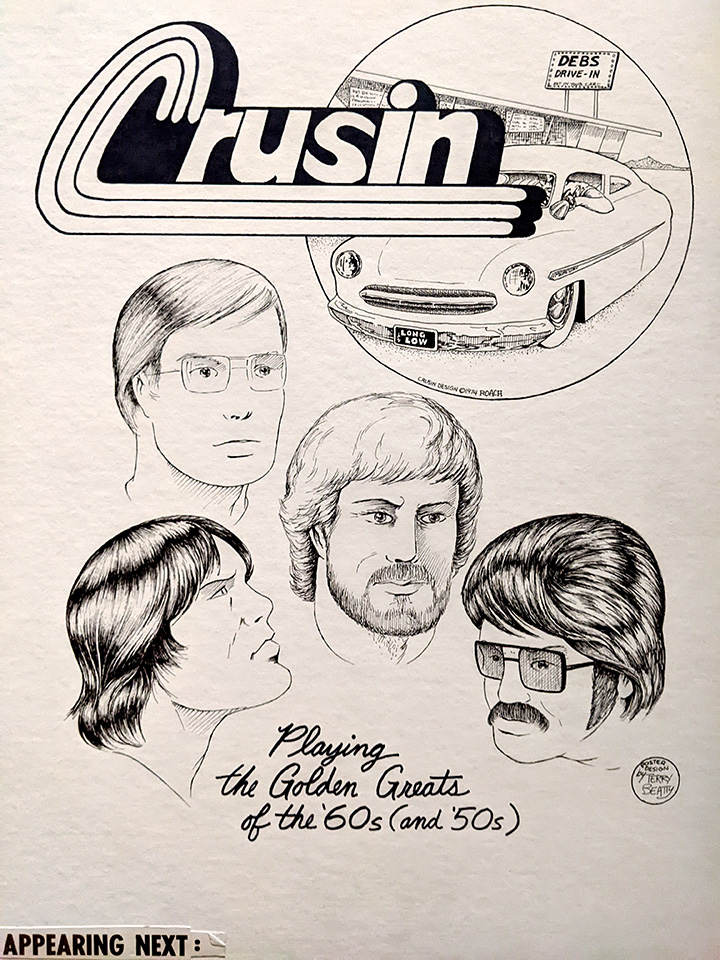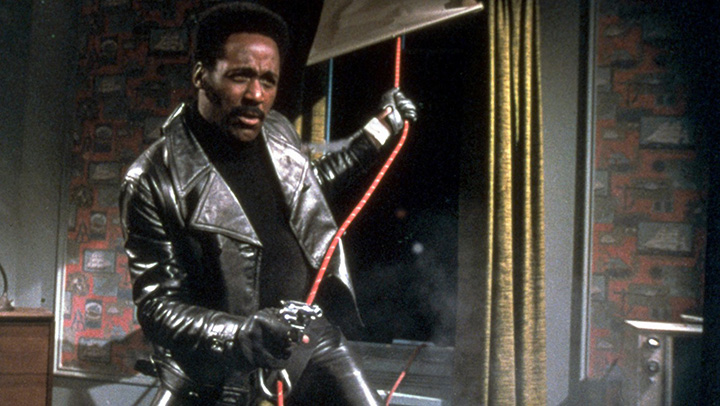I have commented here before that being at my ripe old age means that too often I have to pay tribute to heroes and friends who have passed on. This week I am saluting one of each.
Lenny Sloat has passed away. He was the first guitar player in my band Crusin’, and performed with us (if my fading memory serves) for about a year, probably in 1974. A handsome man in the All-American mode, he was a terrific member of the band, a guitarist who had been among the first in the area to perform in what we used to call a “local pop combo.”
His first group was, again if memory serves, the Coachmen, who played instrumentals in the Ventures vein. His second group, the Rogues, was perhaps the first band in Muscatine, Iowa (my home town, where I still live) to play their instruments and sing, following the path of the Beatles. They were good, both musically and as super cool showmen, and justifiably popular, and were – with my pals the XL’s of Wilton – the inspiration for me to get into playing rock ‘n’ roll with my own band, for money ($25 a gig, a rate that lasted longer than I care to remember).
A more sophisticated band called Depot Rains (one of those inexplicable band names of the era) was the effective and popular follow-up to the Rogues.
When my longtime musical collaborator Paul Thomas (gone too long now) and I decided, in the wake of the film American Graffiti, to resurrect our list from the days of our previous band, the Daybreakers, and call it nostalgia, we needed a guitar player. Our frequent collaborator, Bruce Peters, was pursuing his musical dreams in California. I think both Paul and I came up with contacting Lenny almost immediately – he had been a local idol to the Muscatine High School kids, which included us.
Lenny came on board and brought his low-key, charismatic demeanor to the party, as well as his skill at playing and singing ‘60s music. We practiced for long hours in the basement of our drummer, Ric Steed. We were decent from the start and, after a lot of time and effort, got to be pretty good. We were ready. Somebody – maybe Lenny – approached the owners of the local nightclub, the Warehouse Four (coincidentally in the former warehouse of my wife Barb’s family before their grocery distribution business went under), who gave us a try.
Nobody was doing ‘60s nostalgia yet. It was only a handful of years since the real ‘60s! But Paul and I had the itch to play again in a period where the music on the radio didn’t appeal to us. We hoped others would respond to the ‘60s material, too.
They did.
We were a smash at Warehouse Four, and became a staple there, and at the wonderfully named Tuffy’s Talk of the Town in Grandview. We played every weekend here in the Eastern Iowa area, and were enormously popular. (Which is part of what landed Crusin’ in the Iowa Rock ‘n’ Roll Hall of Fame in 2018, an honor that pleased Lenny very much).

Crusin’s poster (the first) drawn by Terry Beatty
Lenny and I got along great, and he was a fine singer, too – we harmonized well. We never had a lick of trouble in the band, no arguments about material or performance style or anything. Trust me, that’s unusual. The problem was how popular we got. We started getting offers that took us out of state and got the yen to go pro. But Lenny, who had a family and a really good job at HON Industries (my late father had been the personnel man there, and I think may have hired him), could not go full time with Crusin’. It would have been crazy for him to.
After he left the band, I was devastated to lose him. I am not embarrassed to say tears were shed. But it was the right choice for him, the only one really, and our longtime musical accomplice Bruce Peters came back from California to step into the Lenny’s slot and build on what this fine local musician had accomplished. We were very nervous on our first gig at Warehouse Four, minus Lenny, but fortunately we were accepted, despite the predictable grumblings.
Crusin’ evolved into the Ones, and I left the band, largely because I’d landed writing the DICK TRACY comic strip and had family and work responsibilities similar to Lenny’s that kept me from devoting all my time to music. And I hated the travel. When that version of the band split up, I put a version of Crusin’ back together to play our high school reunion (I’m guessing in the mid-‘80s) and Lenny rejoined us briefly to play that final gig with much of the original line-up, Paul Thomas included.
Lenny always had a smile and some friendly conversation for me when I ran into him here in Muscatine. If he had any resentment toward being put on the spot where going pro or staying behind was concerned, he never showed it. He was pleasant and kind, and that smile. What a smile.
Thanks, Lenny.
When someone iconic passes, it’s always a shock.
And I guess I thought Richard Roundtree would live forever. Well, in a way he will, because John Shaft will certainly live forever.

Barb and I loved that movie, the first Shaft, though truth be told it’s a rather run-of-the-mill private eye tale at heart. What separates it is its setting in Black neighborhoods of New York City, in which the mob boss, the hoodlums, the gangbangers, are all from that part of the world, little seen by white America. But don’t be mistaken – the Blaxploitation genre that Shaft ignited wasn’t strictly aimed at, or enjoyed by, Black audiences – White moviegoers were caught up in this new phenomenon, too. John Shaft, in the cover copy of the first novel featuring him, was described as the Black Mike Hammer. So you know I bought that book, well before the movie existed, and that I was there opening night.
I’ve discussed the thrill of witnessing Sean Connery say “Bond, James Bond,” and I have similar feelings about Darren McGavin and Craig Stevens in the first episodes of Mickey Spillane’s Mike Hammer and Peter Gunn that swept over me on a tiny TV screen. All three of these were coupled with wonderful, unforgettable music.
But who had a better musical entrance than John Shaft?
That Issac Hayes score, accompanying a confident, cocky Richard Roundtree walking through a Manhattan sidewalk crowd, was among the most unforgettable moments in movie history – arguably the number one entrance of an iconic private eye on screen.
Roundtree was up to the job of conveying everything about Shaft that made the character special – his relationship with his Pat Chambers on the PD, the casual womanizing, the bravado, the masculine sense of humor with a laugh that rumbled up out of him like amused lava. You saw this man winding his way through downtown Manhattan and brazenly striding through traffic and you knew – this was a man, this was a hero, this was an instant legend.
Mistakes were made. The second movie, Shaft’s Big Score, was good with a phenomenal climax, but for some reason the outstanding third film, Shaft in Africa, seems to have been barely released. It was one of those movies I waited for, and waited for, and it never came. I saw it on VHS, years later, and it’s arguably the best of the three. I did at the time watch the much-maligned TV series, starring Roundtree, which is much better than it’s cracked up to be (the complete series is on DVD from Warner Archive, a handsome set).
In recent years there have been two Shaft movies, relegating Roundtree to essentially cameo appearances in his own franchise. That didn’t stop him from stealing the third movie.
And he had a good career. Not the career he deserved, but he always seemed to work. Hollywood did not understand that a superstar had been born – all they saw was Shaft.
But that will be enough to keep Richard Roundtree alive as long as people watch movies.
Here’s a nice write-up about Spillane – King of Pulp Fiction.
Chad Bishop and I are already at work on the edit of Blue Christmas and it is going well. I am thrilled to have done another film and in particular of this favorite among my short fiction. Finally, a private eye movie!
I hope our lack of name talent doesn’t do us in. Our best known player is Alisabeth Von Presley, who appeared on national television on American Idol and America Song Contest. The cast is strong, however, with Rob Merritt, Von Presley and Chris Causey (our topbilled actors) in particular standing out.
We got some local publicity, though we didn’t seek it, not wishing our short shoot (six days!) to be compromised by set visits. The Muscatine Journal did a good job, though.
Our First Camera Assistant, the indefatigable Liz Toal, wrote a nice piece about me on Facebook, which I’d like to share.

“I have worked on many projects, small, large and everything in-between. What I favor most is working and learning alongside some of the greats! Award-winning cinematographers that take my breath away. Gaffers who have been around the block or two with countless jokes and tricks up their sleeves. Talented Key Grips and AC’s who quickly troubleshoot, build and solve issues under extreme pressure. Experienced Directors who communicate their vision clearly and who are flexible yet knowledgable to know when they should or shouldn’t adjust the script on the fly. Working with and learning from fine-tuned oiled crews will always be my favorite. Without a talented crew, there is no film.”
Fast forward to last week. I was setting up A-Cam for the next shot and glanced up. I saw yet another talented great who was deeply immersed in his script…Writer/Director: Max Allan Collins Jr. (Best known for his graphic novel/script,
Road to Perdition).I have known Max for some time now and just talking with him is an ease. Collaborating and working with Max is not just a privilege but a joy. His highly credited writing does not hinder him, it inspires him. That positive inspiration and determination radiates onto his crew. His nostalgic style and stories have an old timeless Hollywood feel which I find refreshing in this very digital, fast paced, modern world.
Until next time Max, thank you.
That’s a wrap!
M.A.C.
Tags: Blue Christmas, Crusin', Mickey Spillane, Passings, Spillane: King of Pulp Fiction
Sorry to hear that Lenny has passed. Great guy. The pages are falling off the calendar too damn fast.
Surprised to see that early poster art here — my memory of it was that it was better drawn than it is. I guess it’s good that I learned a thing or two along the way, but it makes looking at the early work difficult. Too late to redraw it now, I suppose? At least I gave credit to the Roach t-shirt design we flat out swiped.
What a fine essay by Ms. Toal : great to see the early art by Terry !!
Richard Roundtree became one of my heroes when The CBS Friday Night Movies ran “SHAFT”. They cut an entire HALF-HOUR from the film, but I still loved it. So much that I was inspired to spend most of my senior year in high school writing an epic-length mini-comic crime comedy in which my vigilante hero “THE GUN” teamed up with a black private eye who I based on Roundtree. The stupidest thing I ever did in my life was to mail the only existing copy of the final chapter to someone in NYC, who had already read the previous chapters (and mailed them BACK), figuring I’d get it back in a couple weeks. It vanished without a trace. MONTHS of work down the drain. I started making excessive use of photo-copy machines at work after that (which annoyed several people who saw what i was doing over the years). Original art NEVER leaves my house. NEVER again.
As far as I know, “SHAFT’S BIG SCORE” only turned up on TV in Philly on the local channel 6 (the ABC affiliate) at MIDNIGHT. I taped it, and have watched that tape ever since. It’s my FAVORITE Shaft film. (I’m only annoyed that Charles Cioffi wasn’t in it. I loved his scenes in the first film. “What is this BLACK thing? YOU ain’t so black!” “And you ain’t so WHITE, baby!”)
“SHAFT IN AFRICA” didn’t turn up on TV until TNT ran it at 2 in the morning. Do you see a trend here? The SHAFT tv series turned up on TNT… at 4 in the morning. OY.
I saw “SHAFT 4” (hey, it ain’t right for it not to have its own name) in theatres TWICE. Really liked it, but was amused that Roundtree hung out with 2 ladies while Jackson had NONE. Heh heh heh.
“SHAFT 5” (ditto what I said above) was my favorite movie the year it came out, and, my 2ND-favorite of the series. My favorite part is when Roundtree shows up. He STEALS the movie!!!!! I also loved when Jackson said, “You mean like all those years you PRETENDED to be my UNCLE?” Hilarious.
I’ve seen Roundtree in other things, like “AN EYE FOR AN EYE”, when he played the cop opposite Chuck Norris, or “GEORGE OF THE JUNGLE”, where he played the guide laughing at just how dumb “Lyle” was.
Last year, when I finally broke out of a 9-year-stretch of writer’s block, and wrote my 2nd novel, I “cast” Roundtree as the book’s HERO. I was working on full-page illustrations to go with it (in the style of countless 19th century novels), when I suddenly heard he’d passed away. DAMMIT. Now he’ll never be able to read the book.